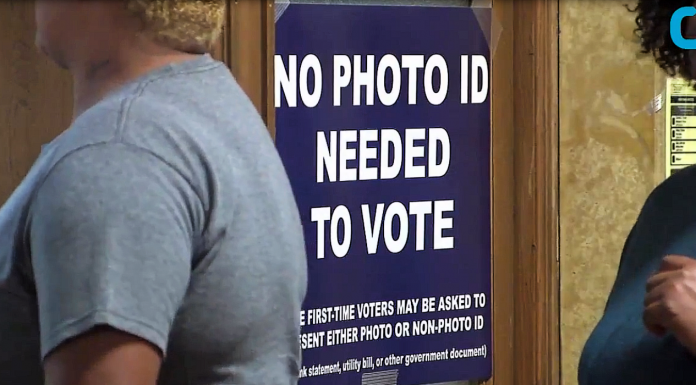A three-judge panel of the Fourth Circuit Court of Appeals on Wednesday overturned a North Carolina District Court’s injunction that prevented the implementation of the state’s 2018 voter-ID law, NCGOP reported in a press release.
The panel voted 3-0 to let the state enforce the North Carolina Voter ID Amendment, a constitutional amendment which voters passed in 2018 by a more than 400,000-vote margin.
The court’s opinion censured District Court Judge Loretta Biggs, an Obama appointee, who committed “fundamental legal errors” in preventing the amendment’s enforcement.
Biggs’ judicial activism served its purpose, however, since North Carolina did not have the voter-ID law for the 2020 election.
While the state narrowly backed President Donald Trump and most of its other down-ticket Republicans, voters re-elected controversial Democrat Gov. Roy Cooper.
The judges on the panel who invalidated the injunction included one of former President Barack Obama’s appointees, Pamela Harris, and two of President Donald Trump’s nominees, Marvin Quattlebaum and Julius Richardson.
“We reverse because of the fundamental legal errors that permeate the opinion—the flipping of the burden of proof and the failure to provide the presumption of legislative good faith—that irrevocably affected its outcome,” Richardson wrote for the panel.
Richardson wrote that Biggs erred in concluding that the plaintiffs—multiple chapters of the NAACP—would succeed in their lawsuit to declare the voter-ID law unconstitutional.
Biggs found that the 2018 voter-ID law was enacted with an intent to discriminate against black voters.
“These errors fatally infected its finding of discriminatory intent,” Richardson wrote. “And when that finding crumbles, the preliminary injunction falls with it.”
Biggs wrongfully assumed that the law had a discriminatory intent because of the Fourth Circuit Court’s 2013 decision that invalidated a voter-ID law.
The North Carolina General Assembly passed voting changes in a 2013 omnibus law, which found that “new provisions target African Americans with almost surgical precision” and “impose cures for problems that did not exist,” The Washington Post reported in 2016.
“A legislature’s past acts do not condemn the acts of a later legislature, which we must presume acts in good faith,” Richardson wrote. “So because we find that the district court improperly disregarded this principle by reversing the burden of proof and failing to apply the presumption of legislative good faith, we reverse.”
Richardson wrote that the General Assembly did not act on a discriminatory impulse but on a constitutional mandate.
“The district court’s who argument also overlooked the state constitutional amendment,” he wrote. “Fifty-five percent of North Carolinian voters constitutionally required the enactment of a voter-ID law and designated to the General Assembly the task of enacting the law.”
The opinion also notes that state Senator Joel Ford, a black man, and other Democrats supported the voter-ID law.
“The sequence of events leading to enactment, legislative history, and disparate impact — cannot support finding discriminatory intent,” Richardson wrote.
North Carolina Senate Leader Phil Berger, R-Rockingham, applauded the panel’s unanimous decision.
“There’s legitimate concern today about undermining trust in democracy,” Berger wrote in a press release.
“When an activist judge overturns the will of millions of North Carolinians who added a voter ID requirement to their own constitution, and rests her lawless opinion on political talking points and ‘fundamental legal errors,’ that’s destabilizing,” he said.
“That is what erodes confidence in government,” he added.

